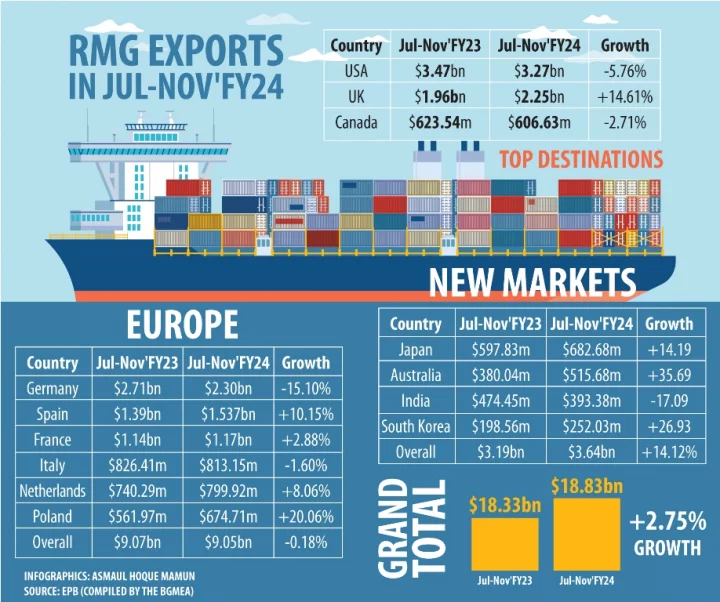Export of readymade garment (RMG) from Bangladesh witnessed negative growth to its single largest (US), second single largest (Germany), and overall largest (EU) destinations in the first five months of the current FY24.
Exports to other major destinations also saw either narrow or negative growths in the same period.

According to the Export Promotion Bureau’s (EPB) country-wise detailed apparel export data compiled by the Bangladesh Garment Manufacturers and Exporters Association (BGMEA), Bangladesh exported apparel items worth $18.83 billion in July-November of FY24, a very narrow 2.75% increase from $18.33 billion in the same period of FY23.
During this period, Bangladesh exported RMG items worth $3.27 billion to the United States, the largest single export destination for Bangladesh, fetching a negative Y-o-Y growth of 5.76%, compared to $3.47 billion of the same period in FY23.
Although exports to the US returned to a positive trajectory in September after consecutive months of negative growth, exports have started declining again since October.
Moreover, exports to Germany, the second largest destination for RMG manufacturers, continued to experience a negative trend as the country was fighting against recession-like economic turbulence and inflation.
Bangladesh shipped apparel worth $2.30 billion to Germany, reflecting a decline of 15.10% from the $2.71 billion recorded in July-November of FY23.
In the July-October period of FY24, with a moderate YoY growth of 14.61%, Bangladesh exported apparel goods worth $2.25 billion to the UK, the third highest destination for the country’s RMG products, up from last year’s $1.96 billion, EPB data stated.
Other destinations
During the July-November period of FY24, the apparel export to the overall EU market witnessed a very narrow negative growth of 0.18% to $9.05 billion, down from $9.07 billion in the same period of last fiscal.
Apparel export to some major destinations such as Spain, France, Netherlands, and Poland registered positive growth by 10.15% to $1.53 billion, by 2.88% to $1.17 billion, by 8.06% to $799.92 million, and by 20.06% to $674.71 million respectively.
However, exports to Italy declined by 1.60% to $813.15 million in the mentioned period.
During July-November, of FY2023-24, exports to Canada also fell by 2.71% to $606.63 million, EPB data stated.
In the context of Bangladesh’s key export destinations, Japan, Australia, Russia, India, China, South Korea, UAE, Malaysia, Brazil, Mexico and some other countries are known as non-traditional markets.
The apparel export to the non-traditional markets reached $3.64 billion with 14.12% year-over-year growth, from $3.19 billion in the last FY.
Among the major destinations of the non-traditional markets, exports to Japan reached $682.68 million, with a Y-o-Y growth of 14.19% from $597.83 million in the last fiscal year.
Although India emerged as a potential non-traditional market, export earnings from India witnessed a downward trend since the first month of FY24.
From India, Bangladesh bagged $393.38 million in the July-November period of FY24, registering a negative growth of 17.09% from $474.45 million in the last fiscal.
Among the major destinations of the non-traditional markets, exports to Australia and South Korea increased by 35.69% to $515.68 million and by 26.93% to $252.03 million respectively, said the EPB data.
Talking to Dhaka Tribune, Mohiuddin Rubel, director of BGMEA, said that exports to non-traditional markets, especially Australia and Japan, were growing and providing support given the current situation.
However, negative growth in Germany as well as the overall Europe and the USA is a concern for them.
Traditional markets are unable to make a comeback from the global economic turmoil, which impacted export, he observed.
Manufacturers are focusing on new markets and producing diversified products which help them to maintain consistency despite the current global situation.
He also said that the exports to India decreased, which is another concern for them.
“We have to work to increase the orders. Still, there is stagnation in the market with low demand. If the global situation changes, then the market will turn around, and we will be better than everyone because we are ahead in all aspects of safety, infrastructure and buyers have confidence in us,” Rubel added.
















